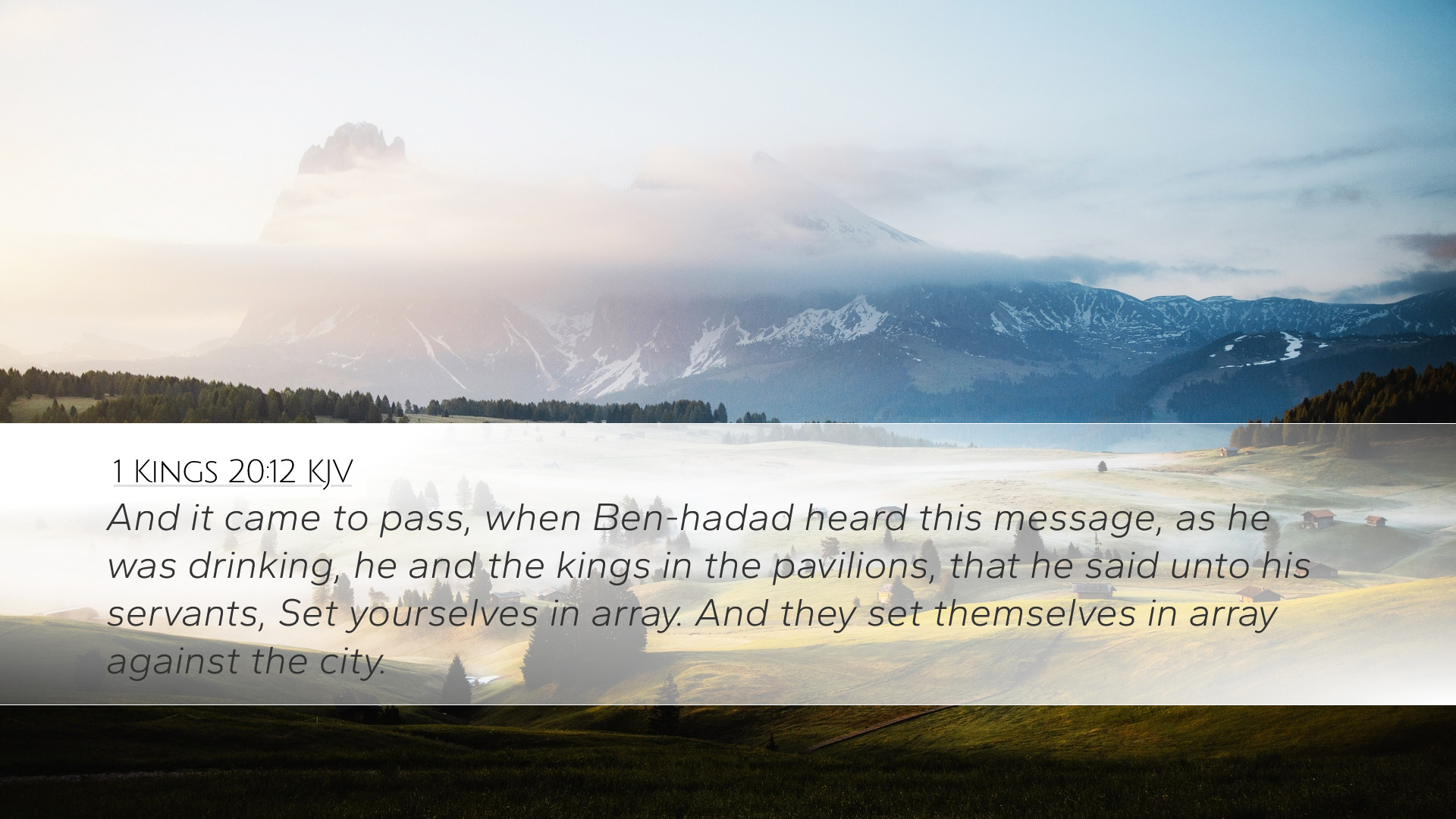Commentary on 1 Kings 20:12
Verse Reference: 1 Kings 20:12 - "And it came to pass, when Ben-hadad heard this message, as he was drinking, he and the kings in the pavilion, that he said unto his servants, Mark ye how ye shall proceed: for this evil is sought against us."
Contextual Overview
This passage is set within the larger narrative of King Ahab's reign over Israel and the conflict with Ben-hadad, the king of Aram. The events of 1 Kings 20 depict the tensions between Israel and Aram, illustrating themes of challenge, reliance on God, and the folly of human pride.
Commentary Insights
Matthew Henry's Commentary
Matthew Henry emphasizes the arrogance and overconfidence of Ben-hadad as he revels in his apparent superiority over Ahab. He notes that while Ben-hadad is engaged in frivolous pleasure—drinking with his fellow kings—he is oblivious to the threat posed by Ahab's determination. Henry points out that this scene serves as a stark contrast between the drunkard's carelessness and the serious nature of the impending conflict.
Henry suggests that Ben-hadad's response—encouraging his servants to strategize—illustrates a common human tendency to react with cunning when under threat. He notes that Ben-hadad's arrogance blinds him to the reality of God's sovereignty, echoing a theme found throughout Scripture where powerful rulers fail to consider divine intervention.
Albert Barnes' Notes
Albert Barnes focuses on the significance of Ben-hadad's situation and his response. He points out that Ben-hadad sits in a position of luxury, yet he is surrounded by danger. In his commentary, Barnes suggests that King Ahab, though seemingly at a disadvantage, is actually the one favored by God in this encounter. This contrasts the worldly views of power and strength with the divine favor that can overturn human expectations.
Barnes further elaborates on the phrase "Mark ye," emphasizing the idea that Ben-hadad recognizes the need for vigilance despite his drunken state. The urgency in the king's orders highlights the unpredictable nature of conflict, wherein one must remain alert even in times of leisure. Barnes reiterates that God's providence often works mysteriously, and a careful analysis of one’s circumstances can reveal divine assistance.
Adam Clarke's Commentary
Adam Clarke presents an analysis of the character dynamics at play, particularly focusing on the implications of Ben-hadad's drunkenness. He argues that such indulgence can lead to folly in leadership, as significant decisions are often made under the influence of pride and distraction. Clarke interprets this passage as a warning against the levity that leaders may exhibit when they presume upon their power and influence.
Clarke also draws attention to the strategic maneuvering that follows Ben-hadad's declaration, noting that the king attempts to take control of the situation. This highlights the ongoing struggle between reliance on one's own capabilities versus reliance on God. Clarke underlines the narrative's core lesson: that human nonchalance can lead to profound miscalculations, especially when divine forces are at play.
Theological Themes
- Divine Sovereignty: The passage reflects the overarching theme of God's control over nations and rulers, showcasing how earthly power often falls short before divine will.
- The Folly of Overconfidence: Ben-hadad's drunkenness symbolizes the dangers of underestimating one's opponent and the necessity of humility before God.
- Conflict and Strategy: The need for vigilance in conflict echoes spiritual lessons applicable to modern believers. This verse serves as a reminder to be prepared and discerning.
Practical Applications
- Leaders and Responsibility: The passage serves as a cautionary tale for leaders who must remain vigilant and responsible, even in seemingly relaxed circumstances.
- Relying on God: In situations of conflict, believers are reminded to seek divine guidance rather than solely relying on human wisdom or strategies.
- Awareness of Arrogance: Just as Ben-hadad's pride led to his downfall, individuals are encouraged to reflect on their own attitudes and avoid complacency in their spiritual lives.
Conclusion
The narrative surrounding 1 Kings 20:12 encapsulates a rich tapestry of themes that resonate deeply with spiritual leaders and scholars. The interplay between human arrogance, divine sovereignty, and the consequences of our actions serves as timeless lessons for believers navigating the complexities of faith in a world rife with challenges.


